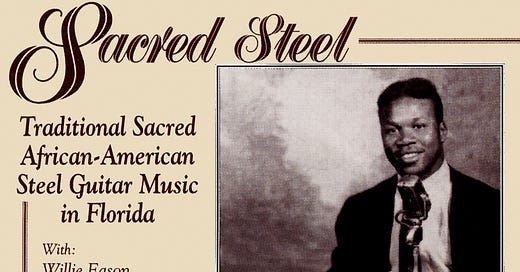Genre of the Day - Sacred Steel
Album of the Day - Sacred Steel: Traditional Sacred African-American Steel Guitar Music in Florida (1997)
The random genre generator is evidently feeling spiritually inclined this week, as both today’s genre and yesterday’s kirtan are performed in devotional religious settings. Amidst turning in exams, I have had to relinquish some control to a higher power, so it certainly resonates. The name sacred steel does not refer to any reverence for engineering. However, the juxtaposition of these elements inspires curiosity whether or not you’re a religious believer; that we can transmute and weld the industrial product of steel into an instrument of sacred resonance is a little miracle of human expression in itself.
Like yesterday’s harmonium or the organs that commonly characterize the instrumental backing of Christian music, most instrumentation for religious purposes lingers with a soft legato touch so as to be contemplative. Typically, then, it makes sense that a comparatively staccato instrument as in the guitar’s plucks and strums never ascended into the canon. Guitars are usually perceived as instruments of individual expression. In Florida’s Black House of God Church communities in the mid-20th century, though, the steel guitar’s longing sound reached a surprising saintly status as the primary accompaniment to services’ religious music.
The House of God Church and the steel guitar were both 20th-century advents, so perhaps joining the two institutions was only natural. The steel guitar was indeed a product of 20th-century ingenuity and music technology’s progress, simultaneously synonymous with a new form of exoticism emerging out of the US’ annexation of Hawai’i that also helped spur genres like exotica. In the 1910s, steel guitar 78 rpm records were some of the best-selling across the US—one Hawaiian guitar player Joseph Kekuku’s simple use of a metal comb to shorten his guitar’s strings and slide the slacked-strings had taken the musical world by storm. Steel guitars were a unique phenomenon, as harps had previously been the only instrument to employ pedals to change strings’ pitches—the steel guitar became even more versatile and widespread upon the introduction of this pedal iteration in the late ‘30s. The whimsical sound of steel guitar’s open chords and stretched notes caught on stateside in blues and country music. Willie Eason, though, heard a different capacity of the instrument as he listened to his older brother taking lessons; he drew a connection between the guitar’s long sighs and the devotional singing in the House of God Church he grew up in, a Black denomination founded in 1904 with a particularly strong presence in Florida. After picking up the instrument himself, he toured his visionary talent from congregation to congregation, and the sound caught on as a unique facet of their services.
Most of these songs are wordless; just as humans can speak in tongues and glossolalia when the spirit moves through them, steel guitars can articulate prayers with their own metallic magic. “Don’t Let the Devil Ride” is a wholly nourishing, rollicking blues thumper. “In the Garden” is a sun-dappled, paradisiacal procession, each guitar note lingering as an organ would, also evident in “Pass Me Not, My Gentle Savior.” At other points of this musical service, the steel guitar rocks the congregation; “Call Him by His Name” commandingly shreds. The instrument bears heaven-struck witness in the sermon of “Just A Closer Walk with Thee,” one of many songs that intimately draws you into this singular religio-musical environment. Besides Christian paeans, there’s an ode to Franklin D. Roosevelt and his efforts to alleviate poverty that illustrates the musical interpretation of history within the church as a crucial social forum. The euphoric suite of “Praise the Lord Everybody” poses the guitar as a celebratory cheerleader. Though the devotional power of this music makes a fascinating and uplifting listening experience for anyone, if any of my followers happen to be in its native state, I hope that all you Floridians are okay as Hurricane Milton passes over, and maybe this music can provide faith and comfort during a dire time.






Love this genre!